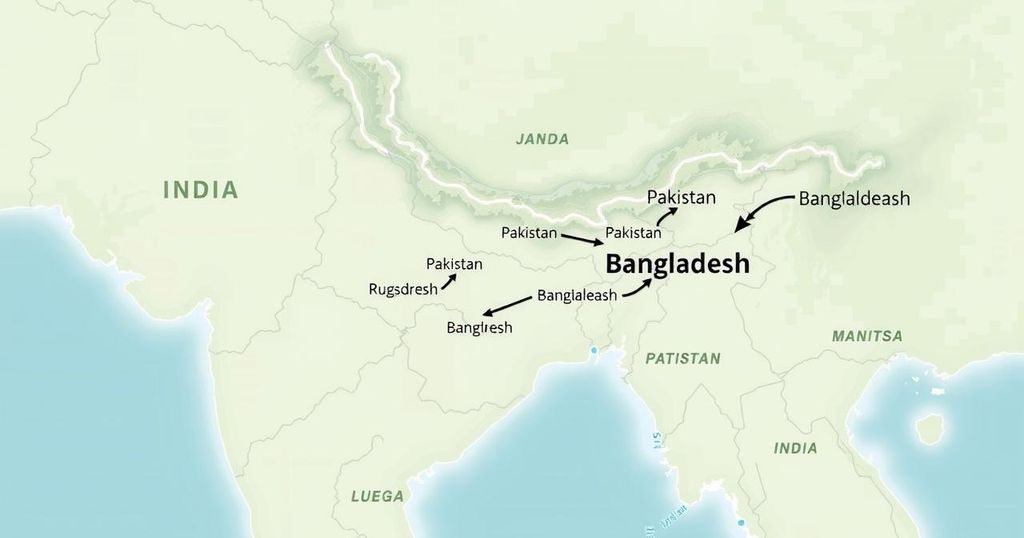Global news
' S, ASIA, AYE, AYESHA SIDDIQA, BANGLADESH, BANGLADESH NATIONALIST PARTY, BNP, COLLEGE, DELHI, DHAKA, DIPLOMACY, EAST PAKISTAN, EUROPE, FOREIGN POLICY, HAS, HASINA, HUM, HUMAYUN KABIR, INDIA, INTERNATIONAL RELATIONS, ISLAMABAD, KING ’ S COLLEGE, LONDON, MUHAMMAD YUNUS, PAKISTAN, SHE, SHEIKH HASINA, UNITED KINGDOM
Jamal Walker
0 Comments
Strengthening Bangladesh-Pakistan Relations Amidst India’s Concerns
Recent political shifts have led to improved relations between Bangladesh and Pakistan, marked by direct trade and military cooperation. The historical animosities stemming from the 1971 war persist, and India is observing developments with concern as bilateral ties evolve.
The political climate in Bangladesh has notably shifted following the ousting of Prime Minister Sheikh Hasina last year, resulting in unexpected warming relations between Bangladesh and Pakistan. For the first time in decades, direct trade commenced, with Dhaka recently importing 50,000 tonnes of rice from Pakistan. Other initiatives include resumed direct flights, simplified visa procedures, and reports of enhanced military cooperation.
The historical animosity between Bangladesh and Pakistan dates back to 1971 when Bangladesh, then East Pakistan, fought for independence, with India’s support for the rebels. While relations were generally cordial from 2001 to 2006, Hasina’s leadership from 2009, strongly allied with India, saw a decline in relations with Pakistan. Recent events suggest a thawing in ties, particularly after Hasina’s temporary exile to India amid protests.
Humayun Kabir, a former Bangladeshi diplomat, noted that for the past 15 years, relations between the two nations were strained but are now reverting to a state of normalcy. India is observing these developments with concern, particularly given its historically contentious ties with Pakistan and Hasina’s ousting.
Some analysts propose that this newfound closeness between Dhaka and Islamabad could be a strategic maneuver aimed at countering India’s influence. Ayesha Siddiqa, a Pakistani academic, pointed out, “Pakistan and Bangladesh have a tactical relationship at the moment. Together, they want to represent a pushback against the dominance of India.” Additionally, military interactions are increasing, with high-ranking Bangladeshi officials visiting Pakistan and participating in joint military exercises.
Veena Sikri, former Indian high commissioner to Bangladesh, referred to the resurgence of ties between Dhaka and Islamabad as a “déjà vu” moment, echoing concerns that insurgents might be trained in Bangladesh with Pakistani support, claims which were denied by both nations at the time. Sikri identified the revival of military relations as a significant security concern for India.
Despite rising tensions, experts acknowledge that neither Bangladesh nor Pakistan can afford to adopt an anti-India stance due to their intertwined economies and linguistic connections. Research indicates that the historical grievances stemming from the events of the 1971 war must be addressed to normalize relations. Bangladesh has persistently sought a formal apology from Pakistan for the wartime atrocities.
Although the need for acknowledgment of past crimes remains a pertinent issue, analysts like Ikram Sehgal suggest that mutual recognition of atrocities is crucial for fostering bilateral cooperation. Currently, bilateral trade between Pakistan and Bangladesh is limited but offers growth potential, as highlighted by Sabrin Beg, who emphasized the long-term benefits of improved trade relations. Future diplomatic discussions, including a visit by Pakistani Foreign Minister Ishaq Dar, may address these important issues as Bangladesh approaches impending general elections.
The evolving relationship between Bangladesh and Pakistan is of significant interest to India, which perceives a stable and friendly Bangladesh as essential for maintaining regional peace and stability.
The reestablishment of relations between Bangladesh and Pakistan marks a significant development in South Asian geopolitics, prompting careful observation from India. While historical grievances from the 1971 war remain unresolved, both nations are pursuing trade cooperation and military interactions. Comes April, further diplomatic engagements could shape the future of these ties, underscoring the delicate balance India must maintain for regional stability.
Original Source: www.bbc.com




Post Comment